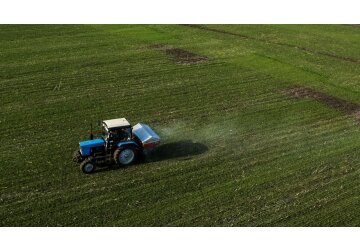
Fertiliser made from human faeces and urine is 'safe' to use on food crops, say scientists
Fertiliser costs have been soaring, contributing to the rapid rise in global food prices and putting increased pressure on farmers and shoppers - but researchers suggest human waste could provide a "viable and safe" long-term alternative.
Fertiliser made from human faeces and urine is safe to use in agriculture and has "huge potential" to replace 25% of current synthetic products in some countries, according to research.
The findings come as farmers continue to struggle with rising fertiliser costs due to a combination of climate change and the war in Ukraine.
Researchers screened human waste for 310 chemicals - including rubber additives, insect repellents and pharmaceuticals - and only found them in 6.5% of the samples examined, but still at low concentrations.
Scientists said low levels of the painkiller ibuprofen and mood-stabilising drug carbamazepine were found - but added that someone would have to eat more than 500,000 cabbage heads to accumulate a dose equal to one pill.
Author Franziska Hafner, a student at the University of Hohenheim in Stuttgart, said products made from human urine and faeces "are viable and safe nitrogen fertilisers" and "did not show any risk regarding transmission of pathogens or pharmaceuticals".
The work by experts in Germany also looked at modern products already being made from human urine which are turned into ammonium and nitrate.
This included Aurin, which was recently approved for use in agriculture in Switzerland, Liechtenstein and Austria, and CROP - combined regenerative organic food production - which is part of ongoing space projects to recycle wastewater for future bases on the moon and Mars.
The lead author of the study Dr Ariane Krause, a scientist at the Leibniz Institute of Vegetable and Ornamental Crops in Germany, said: "If correctly prepared and quality-controlled, up to 25% of conventional synthetic mineral fertilisers in Germany could be replaced by recycling fertilisers from human urine and faeces.
"Combined with an agricultural transition involving the reduction of livestock farming and plant cultivation for fodder, even less synthetic fertiliser would be necessary, resulting, for example, in lower consumption of fossil natural gas.
"Our study results demonstrate that nitrified urine fertilisers such as Aurin and CROP have a huge potential as fertiliser in agriculture.
"They argue for a greater use of these recycled products in the future."
The peer-reviewed research has been published in the journal Frontiers In Environmental Science and comes amid record-breaking food inflation, with many shoppers struggling with supermarket bills.
Last week, a study by researchers at Edinburgh University warned soaring farming costs mostly driven by high fertiliser prices could leave an extra 100 million people starving around the world.
The scientists said the cost of fertiliser along with climate change would have the biggest impact on food security and could cause up to one million more people to die from malnutrition.
Artificial fertilisers are made from or through using fossil fuels - they contribute to global emissions and can be harmful to their immediate environment.
news.sky.com







